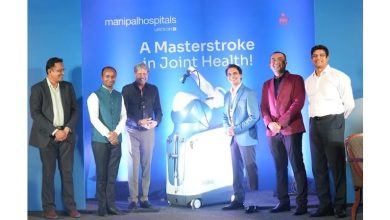Heartline Study: Janssen Pharm, Apple Join in Virtual Research
Can app on iPhone and heart health features on Apple Watch can improve health outcomes

New Brunswick, NJ: Janssen Pharmaceutical Companies of Johnson & Johnson, in collaboration with Apple, opened enrollment for the Heartline™ Study. The study is designed to explore if the Heartline™ Study app on iPhone and heart health features on Apple Watch can improve health outcomes, including reducing the risk of stroke, with earlier detection of atrial fibrillation (AFib). AFib, a common form of irregular heart rhythm, is a leading cause of stroke in the U.S. To enroll in the Heartline™ Study, individuals must be age 65 or older, a U.S. resident, have Original (traditional) Medicare, own an iPhone 6s or a later model, and agree to provide access to their Medicare claims data.
“Heartline™ is a study that has the potential to fundamentally change our understanding of how digital health tools, like the ECG app and irregular rhythm notification feature on Apple Watch, could lead to earlier detection of AFib, helping patients understand and directly engage in their heart health, prompting potentially life-saving conversations with their doctors, and improving health outcomes,” notes Dr. C. Michael Gibson*, Co-Chair of the Heartline™ Executive Committee and Professor of Medicine, Harvard Medical School and CEO, Baim Institute.
Despite the fact that AFib is a leading cause of stroke, people often do not experience symptoms, making it difficult to diagnose. More than 33 million people worldwide and up to six million Americans live with AFib.[1],[2] Up to 30% don’t even know they have it until a serious cardiovascular event, such as a stroke, occurs.[3] According to the U.S. Centers for Disease Control and Prevention, AFib, the most common sustained cardiac arrhythmia, results in 158,000 deaths and 454,000 hospitalizations each year.2
“As we look to tackle some of the greatest health care challenges, we must bring the best minds and capabilities to the table,” said Paul Burton, M.D., Ph.D., FACC, Vice President, Medical Affairs, Internal Medicine, Janssen Scientific Affairs, LLC, a Janssen Pharmaceutical Company of Johnson & Johnson. “Through this important collaboration with Apple, we are pioneering new models that we hope can break down some of the most common barriers to participation in clinical studies. Our work continues to develop and deliver solutions for those impacted by AFib in the areas of detection, treatment and care, through novel approaches, so that we can potentially improve their lives today and well into the future.”
One of the key objectives of this nationwide, randomized study is to assess if a heart health engagement program provided through the Heartline™ Study app on iPhone, in combination with the ECG app and the irregular rhythm notification feature on Apple Watch, can reduce the likelihood of stroke and improve health outcomes with the earlier detection of AFib.
- The engagement program, via the Heartline™ Study app from Johnson & Johnson, will provide ongoing education, tips, surveys and questionnaires across many topics related to overall heart health throughout the two-year active engagement period.
- The ECG app can classify an electrocardiogram as sinus rhythm or AFib.
- The irregular rhythm notification feature will provide notifications of irregular heart rhythms suggestive of AFib.
Through the app-based approach, the study will enable participants to engage in the study remotely, right from their iPhone and in some cases an Apple Watch, rather than travel to a clinical trial site. This approach to conducting a clinical trial, if successful, could potentially save time and cost.
“Apple technology is making a meaningful impact on scientific research through the powerful capabilities of iPhone and Apple Watch, all with privacy at the center of the participant experience,” said Myoung Cha, Apple’s Head of Health Strategic Initiatives. “The Heartline™ Study will help further understanding of how our technology could both contribute to science and help improve health outcomes, including reducing the risk of stroke.”




